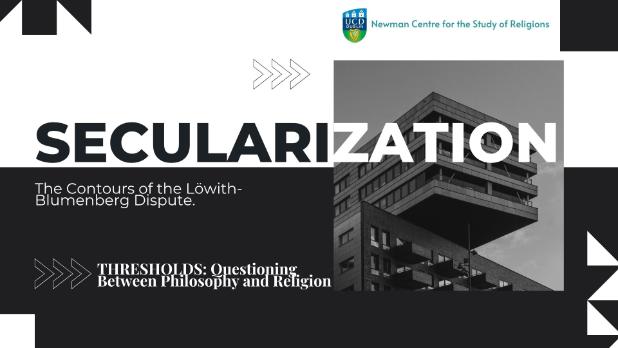THRESHOLDS
Questioning between Philosophy and Religion
Contact: ncthresholds@gmail.com
Operating as part of the UCD Newman Centre of the Study of Religion, THRESHOLDS is an informal fortnightly webinar for academics and graduate students who have an interest in the relation between philosophy and religion, whether from a philosophical, theological, historical, political or literary perspective.
THRESHOLDS is an expansive initiative meant to raise questions relating to all branches of philosophical and religious discourse and is open to all academic researchers, irrespective of religious identity or particular interdisciplinary interests.
THRESHOLDS seeks to open a dialogical space between the twin poles of philosophy and religion. Through countless oppositions the space between remains mysterious and raises countless more questions, and the ambiguities of the relationship between philosophical and religious ideas and experiences remain. Through different focal lenses, THRESHOLDS seeks to ask what the relations between philosophical and religious problems are. Whether they are ambiguous, enigmatic, antagonistic or essential, be they metaphysical or socio-political, and whether rigid distinctions and boundaries can be maintained or whether the space between the two is greyer than first appearances, and whether the true answers to these problems are more complex than they seem; THRESHOLDS hopes to ask why and why not?
Webinar Format:
THRESHOLDS will run fortnightly from 15:00-17:00 (Dublin time) through these dates:
Mon. 22rd September 2025
Tues. 7th October 2025
Tues. 21st October 2025
Tues. 4th November 2025
Tues. 18th November 2025
Tues. 2nd December 2025
Tues. 16th December 2025
Meetings will take place over ZOOM (links sent upon expression of interest) and will involve reading selected texts in English together. Edited and extracted texts are provided via a Google Drive Folder which will made available to all participants. There is no required reading in advance, it is purely up to the the participants how much they want to read outside the webinar. A small selection of relevant and critical material will be made available to participants via the Google Drive alongside the main texts.
First Theme: Secularization
Focus: The Contours of the Löwith-Blumenberg Dispute.

Readings:
Karl Löwith, Meaning in History: The Theological Implications of the Philosophy of History (Weltgeschichte und Heilsgeschehen: Die theologischen Voraussetzungen der Geschichtsphilosophie)
Originally published in English in 1949, then republished in German in 1953, it would eventually be posthumously reprinted as part of Volume 2 of Löwith’s Sämtliche Schriften in 1983.
Hans Blumenberg, The Legitimacy of the Modern Age (Die Legitimität der Neuzeit)
Blumenberg’s Legitimacy was initially published in 1966, then revised and expanded over the following years and republished as three separate volumes in 1973, 1974, and 1976. It was reprinted many times with minor textual variations. Parts I & II were also published separately as Secularization and Self-Assertion (Säkularisierung und Selbstbehauptung) in 1974.
Description of the Topic:
Many have disputed the meaning of the term ‘secularization’, whether in philosophical, sociological or simply historical discourse the term remains ambiguous, indicating many, often contradictory aspects of a historical process. What is generally agreed upon is that ‘secularization’ is a historical process which has occurred in which the public relationship between the sacred and the secular, or between the religious and the irreligious altered entirely. However, immediately questions arise such as: ‘Is secularization limited to Europe and ‘the West’ or is it global?’, ‘Is secularization a movement from within Christianity or Judeo-Christian history, or something entirely political?’ and so on ad infinitum. The question of secularization is the question of modernity itself, and its complexities involve both the sacred and the secular at their deepest levels. These texts attempt to interrogate, comment and critique these questions and interrelations.
Description of the Texts:
Though both are overlooked, Karl Löwith (1897-1973) and Hans Blumenberg (1920-1996) and are not easy to categorize, and neither belonged to any specific ‘school’ of philosophy. This may be because both were multifaceted thinkers whose work was eclectically rather than systematically composed. For instance, Löwith was among the first thinkers to attempt to understand Japanese thought in its own context, rather than simply relative to the West; and Blumenberg’s prolific philosophical essays are also aesthetical theories grounded upon his unorthodox understanding of metaphor and rhetoric, and what he called ‘nonconceptuality’.
They also had very different conceptions of what ‘secularization’ and ‘modernity’ meant, partially in critique of one another. For Löwith, as explicated in his earlier Meaning in History, the secular was essentially Christianity emptied of its contents, and still bore the irreducible trace of its sacramental heritage, the absence of which was responsible for the ambiguous, broken and often tragic essence of modernity. To him, the modern notion of ‘progress’ was a secularized eschatology emptied of all transcendent quality. He was not, however, a nostalgic thinker in any way, and Löwith never argued that this sacredness should or could be restored. His diagnosis was instead a statement of where ‘we’ lie in relation to modernity and what exactly that modernity is. Blumenberg on the other hand, who began writing his own views in explicit response to Löwith in what would become his Legitimacy of the Modern Age, saw modernity as an independent epoch, inherently secular, which grew out of a specific religious context. To him, modernity was the second attempt to overcome Gnosticism, and the heresy thereof. The medieval era had been the first. As such, modernity was self-sufficient and legitimate under its own ‘humanistic’ criteria (both cosmological and anthropological), but these elements were almost imperceptive alterations of ongoing controversies and critical dialogues. With both thinkers, the complex definitions of secularization (even secularity itself) and modernity relied on genealogical and conceptual accounts of the history of philosophy itself. These histories are also philosophical arguments, and involve elements of Löwith and Blumenberg’s own distinctive and underappreciated philosophies. Löwith’s genealogy involves his own form of scepticism, and his diagnostic approach formed through critical engagement with Heideggerian phenomenology and Weberian sociology. Blumenberg’s longer account hinges his own unique definition of metaphor and the significance thereof (his ‘metaphorology’) and his own of theory of historical-causal change as necessarily imperceptible and understandable only in hindsight.
